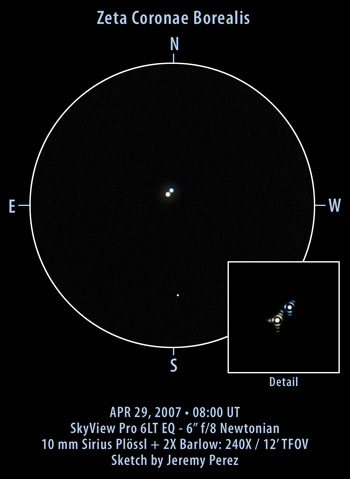
Click image for larger version.
Observation Notes:
This bright double in Corona Borealis provided me with a huge challenge when it came to determining the color of the primary star. At first it appeared cyan, then white, then lime green, before settling at what seemed like pale yellow. Seeing was not that bad, but the color wouldn’t cooperate. It is a B6V star, so it should appear blue. The secondary did appear as a firm blue, which is appropriate for a B7V star. I estimated PA at 304° and the actual value is 301°. The stars were separated by the radius of 5 diffraction rings, which works out to 6.2 arcseconds for my telescope. The WDS catalog value is 6 arcseconds.
| Subject | Zeta Coronae Borealis (STF 1965) |
| Classification | Double Star |
| Position (J2000) | Corona Borealis [RA: 15:39:22.2 / Dec: +36:38:12]* |
| Position Angle* | 301° (1822) |
| Separation* | 6″ (1822) |
| Magnitudes* | 5.1 / 6.0 |
| Spectral Types* | B6V / B7V |
| Date/Time | APR 29, 2007 – 01:00 AM MST (APR 29, 2007 – 08:00 UT) |
| Observing Loc. | Flagstaff, AZ (Home) |
| Instrument | Orion SVP 6LT Reflector (150 mm dia./1200 mm F/L) |
| Eyepieces/Mag. | 10 mm + 2X Barlow (240X) |
| Conditions | Mostly clear, slightly breezy, nearly full moon |
| Seeing | 5-6/10 Pickering |
| Transparency | NELM Mag ~5.0 |
| References | The Washington Visual Double Star Catalog, 1996.0 (Worley+, 1996); Stellar Spectra Classified in Morgan-Keenan System (Jaschek+ 1964); Brian Workman’s Double Star Calculator |
*Based on published data.